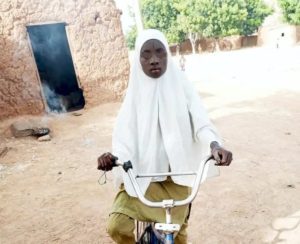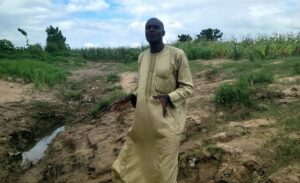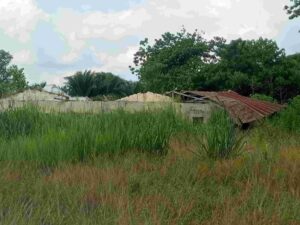Mallam Sani Idris, a resident of Kuri, a sleepy town in the Kibiya Local Government Area (LGA) of Kano State, thinks sponsoring his daughter, Maryam Idris to acquire education before marriage is contrary to the norms and values of his society among other underlying factors.
Despite being well-versed in Islamic literature, Mr. Idris held a belief that the Girl-child should be married off to willing suitors as soon as she reaches a certain age and becomes a lifetime housewife.

Basira Sani, 17, the only daughter of Sani Idris refused to share the same idea with her father. Basira, a JSS2 student of Government Girls Secondary School Fammar, (GGSS), Kibiya has been attending the school with the help of her mother and educational support from the Adolescent Girls Initiative for Learning and Empowerment (AGILE) project.
She said: “I received the support once and put my mind that I will continue to have it as promised and that has not come to fruition for years.
Basira who has the ambition of being a nurse, the empowerment seemed like a lifeline to help her achieve her desired ambition but as the funds dwindled, so did her hope.
This has made her quit and take the option of the Cowpea cake business, because the support from her mother is not enough to cater to her educational needs, since her father is not supportive in this respect.
Basira’s agonising experience is one among many young girls, particularly in Kano rural communities. The situation was dire, and the future of young girls hung in the balance.
This has been the norm for decades, despite awareness that educated girls could become knowledgeable adults and healthier mothers who would in turn raise healthier families to contribute to the well-being of their immediate family, community, and the country at large.
Unlike Sani Idris, Mallam Alhassan Muhammad held a contrary belief.
According to him, education is not just limited to a Western or religious education but a lifetime orientation.

“Education offers girls the necessary skills and information needed to excel in a chosen career. Hence, a girl who is educated can grow to become a teacher, architect, doctor, computer scientist, lawyer, and pharmacist, among other lucrative and noble professions. And by giving girls a right to education we can be able to right the wrongs in our society”.
“I am confident that if we want our future to be full of joy, we need to educate every girl in our society.”
He said “I have known for a long time that girls’ education is a way to nation-building.
“I believe that every parent should do more to make the future of their female children worthwhile. They have to go the extra length to ensure that they do everything possible to empower girls with outstanding education.”
According to him, “Gone are the days when girls were subjected to all forms of domestic chores and denied opportunities of education. A society that disdains education of the girl-child has cogently traded its future.”

These were the main reasons he defied all odds to see his child, Halimatu Alhassan, 15, through primary school education and transited her to acquire secondary school education.

Alhassan said his child, Halimatu, 15, a student of GGSS, Fammar, will continue to study because he wants her to become a medical Doctor.
Halimatu is a very brilliant and determined young girl who is defying all weather to be in school.
Halimatu’s brilliance didn’t come in the platter of gold, according to her father. “So much money has been invested to ensure that she goes to school every day but this was not sustained without challenges.
“As a small-scale farmer, sometimes I used to wake up without a single kobo to sponsor her transportation from Kuri to GGSS, Fammar.”
“In 2022, we were overjoyed to have received the news that our daughters will be empowered through the Adolescent Girls Child Initiative for Learning and Empowerment (AGILE), project, the project could not have come at a better time than now because I am in dire need of financial support to sustain the tempo.”
The Compromised AGILE Scheme
A 2023 study by the United Nations International Children’s Fund (UNESCO), cites Nigeria to have about 20m out of school children, with Kano state accounting for 989,234. This dire situation and the plight of the Girl-child have attracted interventions by donor agencies.
One of the mega Girl-child education interventions is the World Bank Adolescent Girls Initiative for Learning and Empowerment, (AGILE) Project.
The project which is being implemented by the Federal Ministry of Education is geared toward improving secondary education opportunities for adolescent girls aged between 10 and 20.
It is also aimed at curtailing challenges that made accessing and completing secondary education difficult which include but are not limited to socio-cultural, financial constraints, and infrastructural deficits.
By design, the project is meant to improve secondary education opportunities in the implementing states by tackling these challenges, thus making education more appealing to adolescent girls, parents, communities, and institutions.
The current implementing states are: Borno, Ekiti, Kaduna, Kano, Katsina, Kebbi, and Plateau
The states were selected through a consultative process involving the Federal Ministry of Education, Federal Ministry of Finance, Budget, and National Planning, State Governors, and State Ministries of Education.
The selection criteria among others, included the number of out-of-school Girls, secondary school transition rates, the existence of enabling policies on girls’ education as well as the States’ engagement and commitment to improving Girls’ educational attainment and empowerment.
In Kano, the AGILE project disbursed a N20,000 stipend to 45,000 girls as part of the project’s pillar to support the girl-child financially and encourage school enrollment to a significant level.
The disbursement program was chaired by Kano state governor, Engr. Abba Kabir Yusuf at Sani Abacha stadium.
The Selection and disbursement Processes
According to the AGILE Project’s Head of Scholarship, Nasiru Surajo, “the project has four cardinal points for selecting beneficiaries which include; Poorest Community, Transition rate, Out of School children and People Living with Disabilities”.
“The project’s management relied on the National Population Commission for data collection to select the appropriate community that will benefit from the scheme.
“The breakdown for the cumulative N20,000 empowerment is as follows; registration fee N5000, transition fee N5000 and retainership N10,000
“The disbursement is carried out through a bank account duly opened by the beneficiaries.”
Investigation revealed that this process has been compromised as some girls in Kuri town of Kibiya LGA complained of having received N10,000 instead of the officially approved amount of N20,000 since the commencement of the program.
The complainants told Stallion Times that they do not know who takes the remaining balance or what it is used for; they only accept what they were given.
For instance, Alhassan disclosed that he received an alert of N10,000 through a strange account number signifying that it was his daughter’s education empowerment AGILE project.
He disclosed that 50 parents, including him were summoned by the Principal of GGSS, Fammar, Mal. Nura Sani briefed them about the AGILE project empowerment and they were later asked to submit their particulars which include: National Identification Number (NIN), Bank Verification Number (BVN), Phone, and daughters name among other things.
“After some months, we were also asked to go to Rano town and open a bank account with United Bank for Africa.
“We opened the bank but ended up receiving way below 50 percent of the amount promised to be disbursed after charges were paid.
“I added some amount of money to purchase a bicycle for my daughter, Halimatu Sadiyya to ensure that she keeps going to school on time.”
Now, the bicycle is old and I needed money to renew it for her poverty brought me down because I couldn’t afford it.

He said I am now pondering if she could be able to make it to school every day because of her poor mobility.
Another parent, identified as Mallam Nuhu Ahmad Ismail, 37, expressed his gross disappointment over the development.
He said: “The difficulties underwent to open the account alone is worth more than the 50 percent amount disbursed to us as education empowerment.
“Worse still, I cannot even withdraw the total sum of the N10,000 sent to me because it was in one strange Zenith Bank account’s details opened in my name which I wasn’t aware who used my details to open it.
“I had to sacrifice N2,000 to one Yusuf Garko, in Garko L.G area of Kano Who converted the money into his Point of Sale (PoS) machine and also paid N1000 for an ATM card that I don’t know about ending up with N7000”
Following a discreet investigation, it was discovered a total of 48 students of GGSS, Fammar, and Kibiya were registered in the AGILE project.
This reporter could not independently verify all the students’ data to ascertain whether they received the alert of the N20,000 because some of them have graduated or married off.
However, 5 students namely: Aisha Mansur, Saude Isah, Khadija Usman, Ummi Hassan, and Basira Muhammad who got a complete N20,000 alert have not gotten their ATM cards to date. Unlike them, Mariya Shuaibu, 17, has gotten her ATM, although her fortune has faded away.
According to her, efforts to withdraw the money have proven futile, although, she has not been told the reason why she cannot withdraw money by the P.O.S operators in the town, a situation she describes as very frustrating.
Mallam Auwalu Kibiya is a teacher at GGSS Fammar.
He confirmed that a lot of students complained that they had not received any payment after their details were collected.
Kibiya confirmed that it is the officials at GGSS Fammar that collected the account opening details of the beneficiaries and handed them over to AGILE project the officials.
He also disclosed that the school authority is not part of the stakeholders that see through the selection and disbursement processes.
Verifiable facts abound indicating that students like Sa’adatu Uba (Ta’Ado) who is physically challenged have not been coming to the school due to the absence of the scholarship.
Sa,adatu confirmed to this reporter that abject poverty is one of the key reasons why she’s not been attending school on a regular basis.
AGILE Reacts
Reacting to this development, the Gender officer of the AGILE project in Kano, Mal. Sadiya Zakari said the actual amount for the educational empowerment stipend is N20,000.
In a telephone interview, Zainab said, “No beneficiary should receive anything less than the approved amount of N20,000.”
She attributed the N10,000 disbursement as an error of commission or technological default from the bank if there’s any.
According to her, the Scheme has a special grievance unit where all complaints are being addressed.
She requested the details of Mal. Alhassan and Mal. Nuhu who received the N10,000 to be forwarded to them for careful verification to understand where the problem lies, and the details have been sent to the AGILE. As of the time of compiling this report, the head of the grievance unit of the project could not provide details of the complainants as requested.
Today, Maimunatu, and Halimatu’s educational progress among others has been threatened and their dreams of getting financial support to complete their education have been shattered.
This publication was supported by the Wole Soyinka Centre for Investigative Journalism (WSCIJ) through Stallion Times under the Collaborative Media Engagement for Development Inclusivity and Accountability Project (CMEDIA) funded by the MacArthur Foundation.


